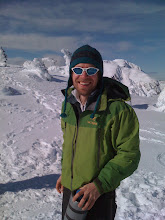Here's the story I wrote about Thursday's meeting of the climate commission.
JUNEAU—The head of the state’s Department of Environmental Conservation said Thursday the state would start looking for ways to reduce greenhouse gas emissions linked to global warming.
Larry Hartig told members of the Alaska Climate Impact Assessment Commission during a two-day public hearing in Anchorage that Gov. Sarah Palin was putting together a sub-cabinet on climate change that will include the commissioners of environmental conservation, natural resources, commerce, and likely transportation, as well as a representative from the University of Alaska and Palin’s representative in Washington, D.C.
Hartig said the purpose of the sub-cabinet was to increase the state’s knowledge about the impacts of climate change and opportunities to reduce emissions. He said the state was still gathering information and wasn’t recommending any action now. But he mentioned a recent study of sources of emissions within the state and suggested the state could join existing regional initiatives to reduce emissions.
“The fact is, Alaska’s a little bit behind the curve,” he said.
Hartig said the sub-cabinet hoped to work closely with the climate commission, local communities, and other groups.
The 11-member climate commission was formed last year by the Legislature to study the impacts of climate change and recommend ways to deal with them. It has held public hearings in Fairbanks and Juneau, and is scheduled to meet in Kotzebue in June.
On Thursday, the commission took invited testimony from state and federal agencies, university experts, and the public.
Two officials from the Department of Natural Resources talked about how changing weather patterns were affecting travel on the North Slope and the ability to build ice roads for tundra travel.
“We’ve seen a real reduction in the length of the season for the oil companies to explore,” said Wyn Menefee, chief of operations for the Division of Mining, Land, and Water. “What we have is less exploration, less development of wells, and less oil down the pipeline, and that’s going to affect our economy.”
Menefee and Gary Schultz, a natural resource manager, acknowledged that regulations have changed as well as the weather, but said the season for winter travel has dropped from about 200 days 30 years ago to 100 days now.
Schultz said there’s been a trend in the last decade toward heavy snows early in the winter. The snow insulates the ground and prevents it from freezing, delaying the tundra opening. Before 1996, he said, snows came later, allowing the ground to freeze solid.
He said the department has teamed up with the industry in recent years to find ways to lengthen the season without harming the land.
James Partain, who oversees the National Weather Service in Alaska, said he never paid much attention to climate change until he got to Alaska, where the changes are visible and significant. He described how changes in sea ice were affecting everything from hunting whales to flying airplanes, and suggested the consequences of climate change were little understood.
Thirty years ago, a pilot flying along the shore in early winter could fly into a cloud if he had to and know it wouldn’t ice up his plane because it was made of ice crystals, he said. Now the clouds might contain water droplets, and could cause icing, but not everyone knows that.
“We’ve got pilots that are using old paradigms based on old climate,” he said.
Other invited witnesses talked about potential impacts on agriculture, engineering, and fisheries.
About two dozen people, including Anchorage Mayor Mark Begich, testified during the public comment period.
Begich argued the state should work now to slow climate change rather than suffer even greater consequences later, and he urged the commission to take action.
A handful of women from around the state spoke on behalf of a group called “Mothers for Alaska.”
“Mothers have that natural polar bear instinct to protect their young,” said Lori Fickus of Fairbanks.
Fickus described a handful of unusual nature-related events, including intense forest fires and the recent discovery of a beluga whale near Nenana, and said the whole thing frightened her.
Kathleen Carroll of Fort Yukon described how the permafrost was melting in her village.
“Global warming we see in our own backyards,” she said.
Carroll urged members of the commission to educate young Alaskans about the issue and consult Native elders when coming up with recommendations.
Others described the changes they had witnessed and called on the commission to promote energy efficiency and renewable energy.
“Climate change is hurting our economy and it’s hurting our Alaskan way of life,” said Scott Anaya of the Alaska Building Science Network.
The commission is scheduled to hear from the department of transportation, the U.S. Fish and Wildlife Service, and the Arctic Research Commission when it continues its hearing today.
Subscribe to:
Post Comments (Atom)

No comments:
Post a Comment